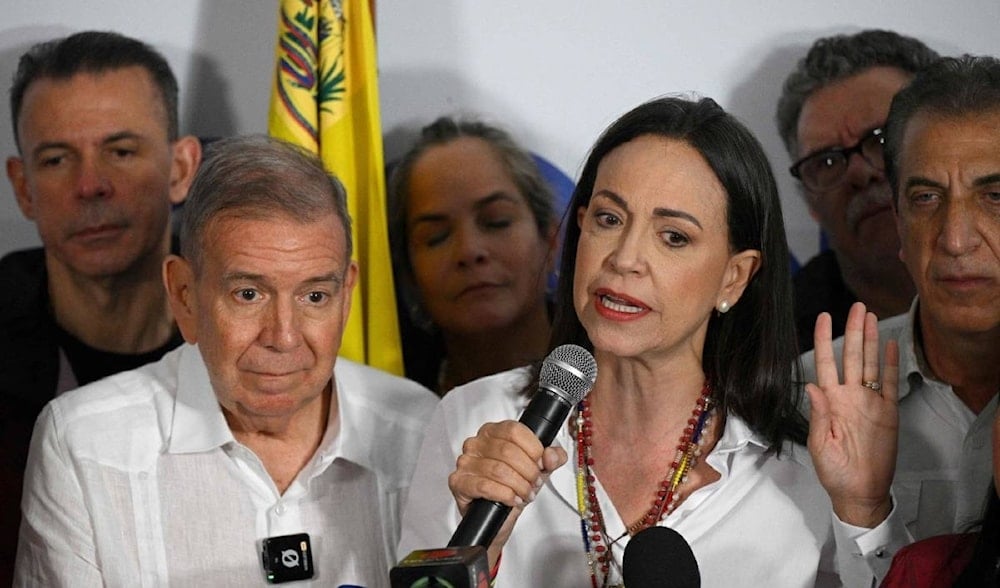Exit poll used by Venezuela opposition sourced from US gov-linked firm
A US government-funded company was the one that published the exit poll of Venezuela's elections indicating the victory of the opposition, indicating foul play in the works to destabilize Caracas.
-

Venezuelan opposition leader Maria Corina Machado talks to the media, with opposition presidential candidate Edmundo Gonzalez Urrutia, following the election results in Caracas on July 29, 2024. (AFP)
The Venezuelan presidential elections took place this week with Nicolas Maduro emerging victorious with 51% of the votes, securing a third term in office.
However, the United States and the Venezuelan opposition accused the president of electoral "fraud" following the release of an exit poll conducted by Edison Research, a US-linked company that essentially caters to the reinforcement of the American agenda and US propaganda outlets founded by the Central Intelligence Agency (CIA), according to a Geopolitical Economy piece written by Ben Norton.
The Edison Research poll was conducted on the day of the elections, indicating that right-wing candidate Edmundo González Urrutia would win the elections with 65% of the votes, defeating Maduro's anticipated 31% of the votes. According to Norton, several polling companies in the Latin American country are run by opposition figures and littered with political biases. Following the election results on Monday, the Edison Research poll has evidently proven to be false.
Despite the Venezuelan National Electoral Council (CNE) reporting Maduro won 51.2% of the votes, followed by González securing 44.2% and the remaining 4.6% received by a combination of eight other opposition candidates, as well as the US National Lawyers Guild describing that their delegation in Venezuela "observed a transparent, fair voting process with scrupulous attention to legitimacy, access to the polls, and pluralism," US media outlets and the Venezuelan far-right opposition utilized the Edison Research poll to justify their accusations of a rigged election.
The poll was cited by Venezuelan opposition leader Leopoldo López, a US-backed, far-right politician, and US media outlets such as The Washington Post, The Wall Street Journal, and Reuters. In addition, the US State Department, which played a key role in backing numerous coup attempts in Venezuela, rejected Maduro's victory while Secretary of State Antony Blinken questioned the election results.
The National Lawyers Guild criticized the opposition's "attacks on the electoral system as well as the role of the US in undermining the democratic process."
Edison Research
Understanding the political economy of a company provides a clear perspective of its political views, agendas, and ideologies that are shaped by its funding and ownership. Essentially, the Edison Research firm's top clientele consists of CIA-affiliated US media outlets infamous for their spread of propaganda, and mis- and disinformation against the country's adversaries.
Edison Research is renowned for its international research, conducting polls in countries such as Ukraine, Iraq, and Georgia. However, the firm's research is managed by its Executive Vice President Rob Farbman "with a specialization in the Middle East and Africa for clients including BBC, the Voice of America, the Middle East Broadcasting Networks, and Radio Free Europe/Radio Liberty," according to its website.
These state media outlets play a pivotal role in what The New York Times described back in 1977 as a "Worldwide Propaganda Network Built by the CIA" due to their spread of disinformation and propaganda against China during the Cold War period. In the modern era, these media outlets continue to manufacture propaganda against people, countries, organizations, or governments that oppose their beliefs, especially Russia, China, Iran, Cuba, and Venezuela.
Radio Free Europe and Radio Liberty (RFE/RL) were also identified by the Times as "CIA broadcasting ventures." RFE/RL describes itself as "funded principally by the US Congress through the Central Intelligence Agency (CIA)," according to its website.
US government's support for Venezuelan opposition and coup d'etat
The United States has a history of attempting coups in Venezuela, such as in 2002 when the Venezuelan military was backed by US forces to briefly overthrow President Hugo Chavez before he re-assumed office after large protests. In the same way, the Trump Administration referred to Juan Guaidó, a right-wing politician, as the country's "interim president" even though he never participated in a presidential election.
Washington and the Venezuelan opposition have a sort of alliance, with the United States investing millions of dollars through the National Endowment for Democracy (NED) and the US Agency for International Development (USAID) to provide the opposition group's political parties, media outlets, and supposed NGOs with financial aid and training.
In contrast, the United States has also seized Venezuela's foreign assets and imposed sanctions, resulting in the government’s revenue reportedly shrinking "by 99% with the country currently living on 1% of its pre-sanctions income," top UN expert on sanctions, Special Rapporteur Alena Douhan said. Additionally, the economic deterioration of Venezuela caused by US sanctions resulted in the deaths of 40,000 people from 2017 to 2018, according to a research paper published by economists Mark Weisbrot and Jeffrey Sachs.
'Long-range interests of the United States'
The US news outlets are ultimately influential tools that hold significant hegemonic power, "reaching 420 million people weekly in 63 languages and over 100 countries," according to the US Agency for Global Media (USAGM), the company that oversees the media outlets' operations.
USAGM is owned by the United States Information Agency (USIA) and funded by Congress, where Joe Biden recently requested a $950 million budget for the 2025 fiscal year. USAGM essentially serves the "long-range interests of the United States," a notion maintained by Congress following its implementation of the Internationa Broadcasting Act in 1994, highlighting US media outlets must "be consistent with the broad foreign policy objectives of the United States”, and note they are "advancing the goals of United States foreign policy."

 5 Min Read
5 Min Read








